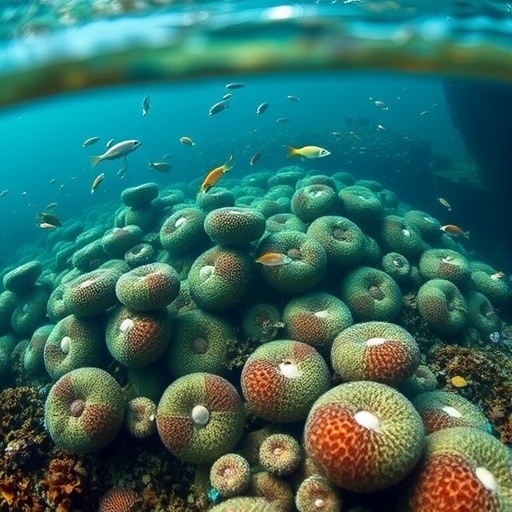In the realm of environmental science, significant strides are being made to comprehend the ecological intricacies of various ecosystems. One such endeavor emerged from a recent study by Saddiki, Layachi, and Akodad, focusing on the Mediterranean coastal lagoon and its benthic communities. This research sheds light on the essential role these communities play in assessing the ecological health of such vulnerable ecosystems, where freshwater meets saltwater and biodiversity thrives amidst human impacts.
Benthic communities, comprised of organisms living on or in the sediment of water bodies, serve as critical indicators of environmental quality. The Lagoon’s unique characteristics create a melting pot for various species, but these communities also face pressures from anthropogenic activities, such as urbanization and agriculture. The ability to use benthic organisms as bioindicators allows scientists to gather valuable insights into the lagoon’s ecological status and potential threats to its biodiversity.
The methodology employed in this study underscores the importance of integrated assessments in ecological research. By combining biological data, physical parameters, and chemical analyses, the researchers were able to create a comprehensive picture of the lagoon’s health. Such multifaceted approaches are vital in understanding complex ecosystems, as they enable scientists to identify correlations between different environmental factors and their cumulative effects on benthic communities.
As the researchers delved into the diversity of the lagoon’s benthic organisms, they discovered a rich tapestry of life. The presence of various species not only indicates a robust ecosystem but also reflects the rarity of certain taxa that are sensitive to pollution and habitat degradation. This biodiversity is crucial for maintaining ecological balance and supporting the various ecosystem services that coastal lagoons provide, such as nutrient recycling and habitat formation.
Another key aspect of the study was assessing the impact of external stressors on benthic communities. The researchers identified several critical threats, including sedimentation, nutrient runoff, and toxic pollutants from nearby urban areas. These stressors can lead to shifts in community composition, resulting in the dominance of more resilient species at the expense of biodiversity. Recognizing these factors is essential for developing effective management strategies to protect the lagoon’s ecological integrity.
The study provides insights into the effectiveness of current management practices in preserving the ecological status of the lagoon. By establishing a baseline for biodiversity and ecological health, the researchers laid the groundwork for future monitoring efforts. This is particularly relevant in a rapidly changing climate, where coastal ecosystems are increasingly vulnerable to the impacts of global warming and sea-level rise.
Furthermore, the implications of this research extend beyond the local ecosystem. Understanding the ecological dynamics of Mediterranean coastal lagoons can inform broader conservation efforts across similar habitats worldwide. By sharing data and findings through scholarly publications, researchers create opportunities for collaboration, fostering a global approach to addressing marine environmental issues.
Another notable finding of the study was the correlation between specific environmental indicators and the overall health of benthic communities. For instance, variations in water quality parameters, such as dissolved oxygen and nutrient concentrations, were linked to shifts in species abundance and composition. This relationship underscores the necessity for continuous monitoring and adaptive management practices to maintain optimal conditions for biodiversity.
As policymakers grapple with the challenges of environmental degradation, studies like this are instrumental in guiding decision-making. The evidence presented in this research can serve as a foundational reference for crafting policies aimed at preserving delicate coastal ecosystems. By prioritizing science-based approaches, governments and conservation organizations can implement measures that balance ecological preservation with human development.
Public awareness and education are also essential components of effective conservation strategies. The findings of this study highlight the interconnectedness of human activities and environmental health. Engaging local communities in conservation efforts can foster a sense of stewardship and responsibility toward the lagoon ecosystem. By educating the public about the significance of benthic communities and their role in ecological assessments, a collective effort can be made to protect these vibrant environments.
Additionally, the research emphasizes the value of interdisciplinary approaches in tackling environmental issues. Collaboration between ecologists, oceanographers, chemists, and policymakers can enhance the understanding of complex ecological interactions. As the challenges posed by climate change and habitat degradation continue to escalate, such partnerships will be critical in developing holistic solutions to safeguard biodiversity and promote sustainable practices.
In conclusion, the integrated assessment of the Mediterranean coastal lagoon conducted by Saddiki and colleagues marks a significant contribution to the field of environmental monitoring. By highlighting the vital role of benthic communities as indicators of ecological status, the study not only enriches our understanding of coastal ecosystems but also provides essential insights for future conservation efforts. As we navigate an increasingly uncertain environmental landscape, the findings serve as a reminder of the importance of protecting our natural resources for generations to come.
Subject of Research: Mediterranean coastal lagoon and benthic communities.
Article Title: Integrated assessment of the ecological status of a Mediterranean coastal lagoon based on benthic communities.
Article References:
Saddiki, Z., Layachi, M., Akodad, M. et al. Integrated assessment of the ecological status of a Mediterranean coastal lagoon based on benthic communities. Environ Monit Assess 197, 1319 (2025). https://doi.org/10.1007/s10661-025-14706-y
Image Credits: AI Generated
DOI: https://doi.org/10.1007/s10661-025-14706-y
Keywords: Benthic communities, ecological assessment, Mediterranean coastal lagoons, biodiversity, environmental monitoring.




